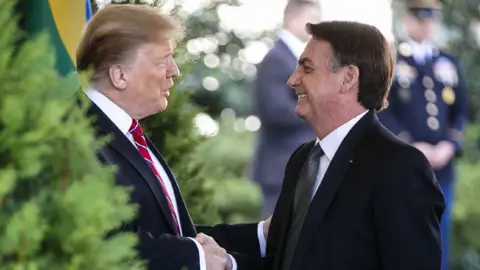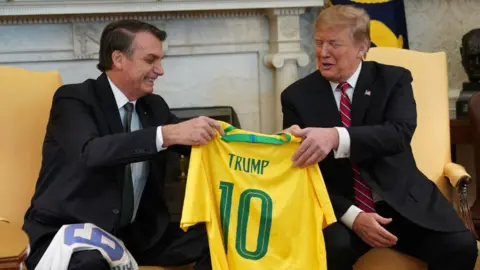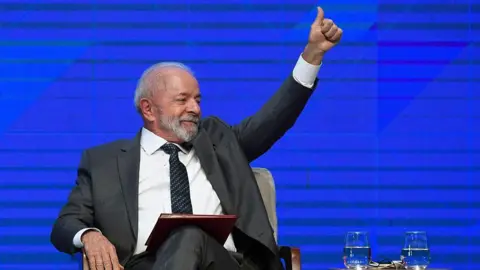Why is Trump targeting Brazil - and will it backfire for Bolsonaro?
 Getty Images
Getty ImagesA message from US President Donald Trump on Wednesday landed like a grenade in Brazil, bringing the relationship between the two countries to an all-time low.
Trump pledged to impose tariffs on Brazil at a rate as high as 50%. He accused the country of "attacks" on US tech companies and of conducting a "witch hunt" against the far-right former President Jair Bolsonaro, a longstanding ally who is facing prosecution over his alleged role in a plot to overturn the 2022 Brazilian election.
The move follows a fresh round of political sparring between Trump and the current Brazilian president, Luiz Inácio Lula da Silva. It further strained a relationship that was already tense.
Trump had earlier threatened members of the BRICS group - of which Brazil is a part - with tariffs, accusing those countries of anti-American positions.
The bloc includes India, Russia and China and has grown to include Iran. It was designed to counterbalance US influence in the world.
Lula replied to Trump's tariff threat in a post on X, writing that "Brazil is a sovereign nation with independent institutions and will not accept any form of tutelage".
Trump has unleashed a wide-ranging programme of tariffs - or import taxes - since he returned to office in January. He argues that these will boost US manufacturing and protect jobs, though he has also used them to pursue political ends.
This appears to be true in the case of Brazil, too.
Lula's government said it would reciprocate - probably meaning equal tariffs on American products. But it is not clear how that would happen, or whether Brazil has the economic clout to face the consequences of an escalation.
In the meantime, many Brazilians are asking why Trump has targeted their country and how this new saga might play out.
Defending an old ally
Brazil is one of the relatively few countries that buys more from the US than it sells - a setup which theoretically suits Trump's trade agenda.
Given this imbalance, the tariff threat was seen by many Brazilian analysts and politicians as an overt gesture of support for Jair Bolsonaro.
This was underscored by Trump's letter, which strongly criticised the Brazilian government and Bolsonaro's ongoing trial in the Supreme Court that centres on an alleged coup attempt two years ago.
Some kind of assistance for Bolsonaro from Trump was already expected by Brazilian politicians - but not on this scale.
On 8 January 2023, hundreds of Bolsonaro's supporters stormed Brazil's Congress, Supreme Court, and the presidential palace - in an apparent attempt to overturn the election won by Lula a few months earlier.
Bolsonaro denies any connection to that event, which was seen by many as a Brazilian version of the attacks on the US Capitol building by Trump's supporters two years before. Trump, too, was investigated in the aftermath of the US riot - and condemned those who tried to prosecute him.
Bolsonaro's supporters have asked for some kind of Trump support for months. His son Eduardo took a leave of absence from Brazil's Congress, where he serves as a representative, and moved to the US. A Mar-a-Lago regular, he has aimed to rally support for his father from Trump's inner circle and his broader MAGA (Make America Great Again) movement.
In another part of his missive seen as firmly backing Bolsonaro, Trump accused the Brazilian government of "insidious attacks on Free Elections, and the fundamental Free Speech Rights of Americans", including the censorship of "US Social Media platforms".
As part of an ongoing investigation into the spread of disinformation in the country, Brazil's Supreme Court has, in recent years, ordered the blocking of several social media accounts - many of them belonging to Bolsonaro's supporters.
 Getty Images
Getty ImagesBoost for Bolsonaro…
Brazil's authorities and businesses are scrambling to calculate the economic impact of the potential tariffs, but the political consequences could also be huge.
The words used by Trump suggest that Bolsonaro has a political proximity to the American president that few Brazilian or Latin American politicians could dream of.
The letter will be seen as a powerful endorsement for Bolsonaro, who wants to run for president again - despite being banned from doing so until 2030 by the country's top electoral court.
The former president's supporters have made political capital of the threatened tariffs, suggesting that the blame lies firmly with Lula, the current president.
"Lula put ideology ahead of economics, and this is the result. The responsibility lies with those in power. Narratives won't solve the problem," said São Paulo Governor Tarcísio de Freitas, a staunch ally.
Yet some analysts and politicians say that in time, Trump's gesture could backfire for Bolsonaro.
The US is Brazil's second most important trade partner, behind only China.
And some of the sectors that could be most affected by a new round of American tariffs are those closely aligned with Bolsonaro's political base - particularly agribusiness. There are growing concerns over the potential impact on Brazilian exports of oranges, coffee, and beef to the US.
… Or lifeline for Lula?
 Getty Images
Getty ImagesRather than playing into Bolsonaro's hands, Trump's tariff threat could serve as a lifeline for Lula, who has been struggling with falling popularity rates and difficulties in dealing with Congress.
A poll released in May suggested that 55% of the Brazilians disapprove of Trump. And a new wave of tariffs is unlikely to shift that sentiment.
Just after Trump's announcement, Lula and other members of the Brazilian left-wing reacted by playing a nationalist tune - talking about sovereignty and trying to blame Bolsonaro for the possible economic consequences of the tariffs.
Yet among centrist politicians, the reactions to Trump's threats have also been largely negative.
"No citizen, especially representatives elected by the people, can tolerate foreign aggression against Brazil, regardless of the alleged justification. It's time for true patriotism," wrote Alessandro Vieira, a centrist senator who usually has a critical stance against Lula.
Some analysts argue that this could generate a rally-around-the-flag effect for Lula, who is in dire need of a political boost.
"Even Lula's critics may see Trump's move as an attack on national sovereignty and the independence of the judiciary," said Oliver Stuenkel, a professor at the Getúlio Vargas Foundation (FGV) and a researcher at the Carnegie Endowment for International Peace think tank in Washington.
Brazil's presidential election in October 2026 is still some way off, but some analysts are already drawing comparisons with Canada, where a right-wing candidate who had initially drawn comparisons to Trump lost this year to a more centrist opponent who openly campaigned against the US leader.
With Bolsonaro himself unable to run, allies are already disputing which candidate will represent the Brazilian right at the polls.
On social media - where much of the political debate happens - memes of possible Bolsonaro-backed candidates were being shared by the thousands on Thursday, often with words of criticism connected to Trump's move.
One showed Tarcísio, the Sao Paolo governor and a probable candidate, wearing a Trump MAGA hat.
With his threat of tariffs, Trump has caused a potential storm not only for Brazil's economy - but also its political future.
